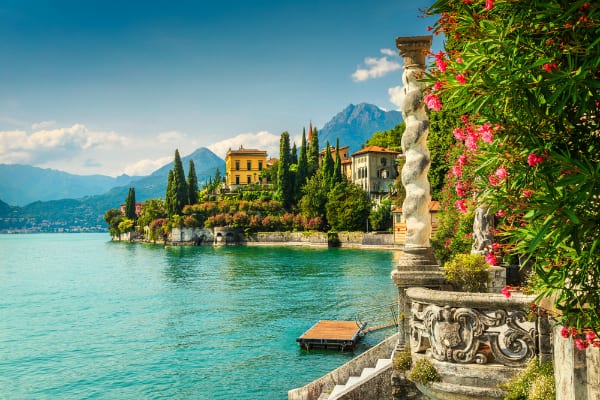Lake Como: a ‘spot blessed by heaven’
Lake Como: a ‘spot blessed by heaven’
Lake Como: a ‘spot blessed by heaven’
-
Hannah
-
Hannah


At the heart of my latest novel, Concerto, is a great composer, Umberto Monteverdi. At least, Umberto was a great composer, until he lost his sight in a terrible accident. Ever since, depression, despair and stubbornness have kept him from his beloved piano.
After the accident, Umberto moved back to his family’s home in Torno, on Lake Como. There, his mother – a famous opera singer – tried to coax him back to his music. Eventually, having exhausted every other option, she travels to Nice to request the help of Catriona Drouot, a music therapist. Catriona refuses to take Umberto on as a client, because the two had a brief but intensely passionate liaison years before. But when the opera singer dies and leaves Catriona a legacy, she knows she must honour the dying mother’s last wish.
So it is that Catriona comes to Villa Monteverdi on Lake Como. Here is Catriona’s first impression of the lake, as she travels across it by boat to the villa:
Under bright sunlit skies the view of Lake Como was wondrous to behold. A deep sense of serenity overcame her as she stared in rapture at the expanse of blue that lay before her. The lake was the finest of mirrors, never reflecting exactly what was above, but converting it to an image so beautifully smudged and broken.
Although Catriona had been tired she found the slow and leisurely ferry ride over the lake exhilarating and almost heart-stopping in its beauty – a lyrical gouache of colour stabbed at intervals by the solemnity of the stately cypress, a tree very much native to Italy. On both sides of the boat the magnificent rocky shores were studded with the gardens of Italian belle époque villas crowded with a wealth of rare trees, exotic flowers and broad lawns, with narrow pink or mellow yellow stone staircases that went down to the edge of the lake. As the ferry glided past, her vivid and romantic imagination conjured up bygone scenes of gentlemen in striped flannels and straw boaters on deck, with ladies in side-buttoned kidskin boots holding their parasols.
Towering over all, and filling half the round of the horizon, reared the mighty Alpine chain with its base wrapped in a robe of imperial purple, flinging its countless crests towards the blue heaven like the defiant arms of the mythic Titans. In the warming rays of the afternoon sun, fragrant blooms were launching their scent on the balmy air while the boat rocked to the liquid ripple of the lake in the infinite silence.
Such a beautiful part of the world – a fitting backdrop for a love story. Yet there is a tinge of tragedy about the setting in Concerto, because only Catriona can appreciate her surroundings. As I write of Villa Monteverdi:
Catriona couldn’t imagine anything more gracious and grand than this emerald chalice, set like a jewel in a ring of splendid hills, dominated by the snow-capped Alpine summits to the north. Yet its owner was now denied such a breathtaking feast for the eyes.
For Umberto, the beauty of the scenery is another reason to feel depressed about losing his sight. He tells Catriona:
‘Franz Liszt said Lake Como was a “spot blessed by heaven”. Unfortunately, now I can only guess its beauty by the scent and feel of it.’
Still, inherent in that sad statement is a means by which to connect with the setting. Umberto cannot see Lake Como, but he can enjoy the scents and sensations of the land and the water; he can walk in the fragrant gardens and he can swim in the cool, fresh lake. It is not enough; how can it be? But it is not nothing; it is something – and a beautiful something, if only Umberto can cast off his cloak of despair.
Perhaps, with Catriona’s help, he can come to find solace and strength in this ‘spot blessed by heaven’, and in doing so be blessed by heaven himself.
Looks like this will be another wonderful book. Umberto’s sadness at not being able to see the beauty of the region is a reminder of my wife’s grandmother who went blind in her late eighties. She would cry because she could no longer see to read. She was able to listen to books, but to her it wasn’t the same. It was so sad because when she was in her early eighties she went on a seniors’ trip to New Orleans. When asked how she enjoyed the trip she answered that it was OK except for those old people getting… Read more »
Thank you for commenting. The story line was inspired by people I have known who lost their sight and struggled so to come to terms with it. Your grandmother must have been so frustrated. Bless her.